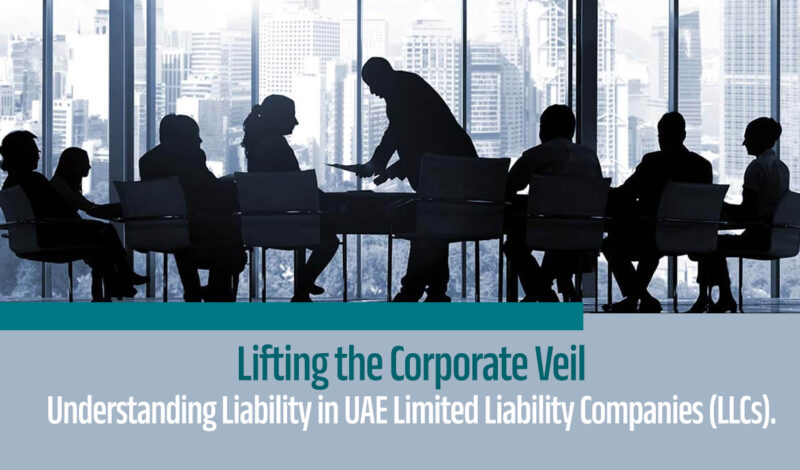Introduction to LLCs and Limited Liability
A Limited Liability Company (LLC) is considered as one of the efficient ways to start a business in the UAE due to its distinct advantages, particularly the concept of limited liability. These are recognized as separate legal entities, allowing them to enter contracts, sue, and be sued in their own name, independent of their owners. Article 21 of the UAE Companies Law (Federal Law No. 2 of 2015) grants LLCs corporate personality upon incorporation, LLCs By law, creditors can only pursue the assets of the company, not the personal assets of the shareholders making this structure a powerful tool for risk management.
The legal framework for LLCs in the UAE, as outlined in Federal Law No. 2 of 2015, creates a clear separation between a company’s legal identity and its shareholders. But what happens when that separation is abused?
- Even Though these are separate entities, there are certain cases where the court may “pierce the corporate veil,” and interfere to keep the law intact in certain circumstances. In most instances, courts may hold managers liable, and in special cases, they may even hold shareholders personally accountable for the company’s obligations. This article will go through various instances where the court didn’t hesitate to lift this corporate veil to prevent unfair outcomes.
Fraudulent Acts and the Role of Managers
Managers are held to a high standard of responsibility in the acts of a company’s operations and Under Article 84 of the UAE Companies Law, managers are personally liable for any losses caused by fraudulent acts or gross negligence. If a manager acts in bad faith—whether through financial misconduct or neglect of duty—the court may hold them accountable, even if they were acting under the shield of an LLC being a separate entity.
In Dubai Court of Cassation Case No. 402 of 2020, the court held managers personally responsible for company losses caused by fraudulent actions. This case highlights the importance of managers acting with honesty and care. If they fail to meet these expectations, the protection of limited liability can be removed, leaving them personally liable for the company’s debts.
Dubai Court of Cassation Case No. 69, 70/2007
The courts take stringent measures when the corporate structure is used for personal gain. In cases where shareholders use the LLC to disguise fraudulent activities or shield themselves from debts, they can be held personally accountable. This principle was highlighted in this case where shareholders manipulated the LLC to further their personal interests at the expense of the company’s creditors.
Here, the court lifted the corporate veil by recognizing that the shareholders were abusing the LLC’s separate legal personality to avoid their financial obligations. By transferring company assets to new entities, creating false financial records, and diverting funds for personal gain, they violated the trust of both the company and its creditors. The court held that the corporate structure should not be used as a shield to escape responsibility, making the shareholders personally liable for the company’s debts.
In Dubai Court of Cassation Case No. 92/2012, the court also made it clear that when a shareholder exploits the legal separation between the LLC and its shareholders to engage in fraudulent activities, it is not just a breach of the LLC’s memorandum of association but a clear infraction of the law.
Fictitious Profits and Financial Mismanagement
One of the most common scenarios leading to the lifting of the corporate veil in the UAE is the distribution of fictitious profits—profits that do not genuinely exist or are misrepresented. Article 30 of the UAE Companies Law provides that creditors can reclaim these fictitious profits, even if shareholders acted in good faith. This serves as a safeguard against fraudulent behavior.
If shareholders improperly distribute profits to themselves, without regard for the company’s true financial health, the courts may hold them personally liable. This is particularly true when the company’s creditors are left unpaid due to the improper allocation of funds. In such instances, creditors are entitled to seek repayment directly from the shareholders, bypassing the corporate veil to recover the company’s debts.
Conclusion
The cases discussed above serve as a powerful reminder that while LLCs offer important protections, they are not invincible. The UAE courts have shown that they will not hesitate to pierce the corporate veil when it is used as a tool for wrongdoing. For managers and shareholders, this means a heightened sense of responsibility in their business dealings. Fraud, neglect, or abuse of the corporate form can lead to serious legal consequences, including personal liability.
In essence, the corporate veil can be a valuable tool for business owners, but it must be used ethically and in good faith. The UAE’s legal system ensures that those who try to exploit the system for personal gain will ultimately face the full consequences of their actions. The integrity of the business world relies on fairness and accountability—and the courts stand as a safeguard to ensure that justice is served.

